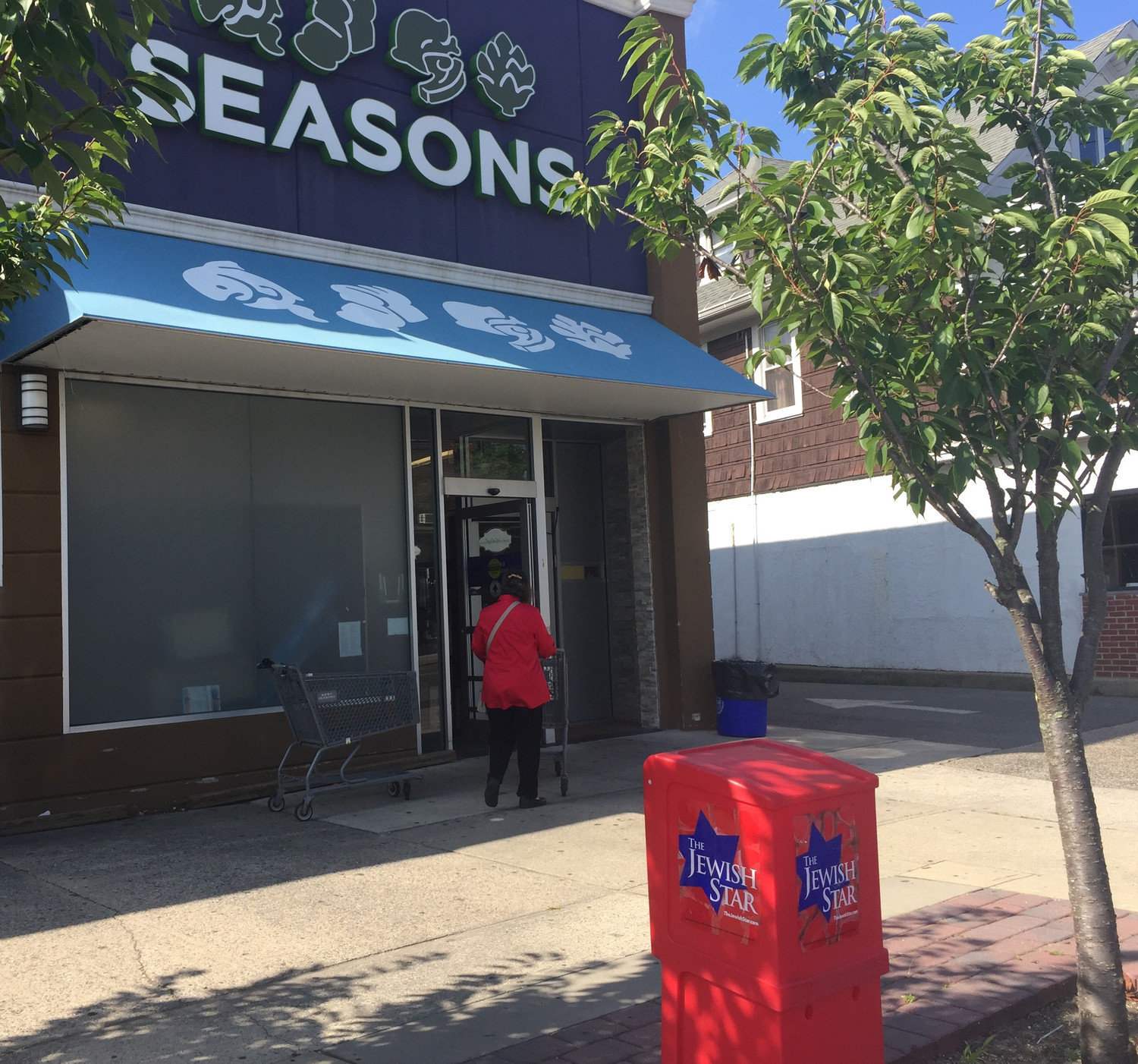Seasons files for bankruptcy
Upscale kosher chain reports $42M in debt
Updated Thursday Sept. 20
Seasons, the upscale Long Island-based kosher supermarket chain with national ambitions, filed for bankruptcy protection this week.
In its Chapter 11 petition, filed electronically on Sunday night, Seasons reported $42 million in liabilities and $31 million in book-valued assets, with millions owed to vendors, landlords, banks and the fomrer owners of Supersol. SuperSol stores formed the core of the original Seasons empire.
News of the filing was first reported late Monday by the Commercial Observer.
On Tuesday morning, erev Yom Kippur, and on Thursday after yom tov, Seasons stores in Lawrence and Kew Gardens Hills were open, although shelves were not fully stocked. Departments operated by vendors — including Mechy’s Gourmet prepared foods, Raskin Fish and others — appeared to be fully stocked.
Sunday’s bankruptcy reflected a rush to obtain Debtor-in-Possession (DIP) financing “to use the proceeds thereof to restock the stores in time for the upcoming Jewish holiday of Sukkos.”
“Without the DIP Loan, the Debtors would have not have sufficient funding to continue operations, and would lose its employees and its leases, thereby destroying the value of their businesses,” the filing stated.
The Seasons chain, established in 2010, operates supermarkets in Lawrence and Kew Gardens Hills; on Manhattan’s Upper West Side; in Scarsdale; in Lakewood and Clifton, New Jersey; and in Baltimore, Maryland. The opening of a store it built in Cleveland, Ohio, and a move into a larger space — a former Gristedes — in Scarsdale had been delayed prior to the bankruptcy filing. Seasons also operates a 24/6 mini-mart branded as Seasons Express on Doughty Boulevard in Lawrence, across the street from the Inwood LIRR station. A second Seasons Express was being developed on Peninsula Boulevard in Cedarhurst.
The bankruptcy petition, filed on behalf of Seasons Corporate LLC and its various subsidaries, was signed by Joel Getzler, identified as consultant and proposed co-chief restructuring officer.
A list of Seasons’ 30 largest creditors included such in-store vendors as Shlomy’s Heimeshe Bakery (over $395,000), Mechy’s (over $205,000) and Raskin Fish Market (nearly $150,000).
Creditors with claims over $1 million are Bank United of Melville ($8,800,000), L&N Consulting ($8,000,000), Bank Capital Services ($1,500,000) and Quality Glatt NJ Corp. ($1,355,473.87).
The bankruptcy filing related that Seasons had been “profitable on an operational basis,” with excess cash flow “used to develop and open new stores and make payments” to the former Supersol owners, Laurence Garber and Norman Lampert. “Over time, however, complications and delays relating to the opening of new stores and the large payments” to the Supersol owners “began to drain cash flow.”
After Seasons failed to make timely payments to Garber and Lampert, those creditors won an award through a Beth Din of $8.3 million. “As a result of the actions by the [Garber and Lampert] and Bank United, [Seasons’] cash was dramatically reduced. rendering it unable to keep the stores stocked,” the filing stated.
In mid-August, the Nassau Herald, the secular newspaper in the Five Towns, reported on Seasons’ difficulties. It quoted this statement by CEO Mayer Gold: “Seasons Kosher, and its predecessor Supersol, is proud to be a mainstay of the Far Rockaway/Five Towns community for almost four decades. Seasons has revolutionized the kosher shopping experience, and we look forward to serving the neighborhood and the kosher consumer for many years to come.”
Last Friday, the Scarsdale Inquirer reported that the Seasons store in that Westchester community had run out of key food items before Rosh Hashanah — “no gefilte fish, no chopped liver and the meat case was empty.”
Gold told the Inquirer that “we have temporarily closed the store till after the holidays as we gear up for the grand opening of our new 10,000-square-foot store” in space formerly occuped by a Gristedes market in the same strip mall.
Asked by the Inquirer about customer concerns, Gold said, “As this is an extremely fluid situation, I can only comment on what our plans are.”
An Aug. 30 headline in Kol HaBirah, a Baltimore-Washington Jewish newspaper, reported that “shortages raise concerns about the future of Seasons.”
It quoted a shopper at the Baltimore store as reporting that “the deli and meat sections are cleaned out, with just some hot dogs and sausages remaining.”
The Cleveland Jewish News wondered on Aug. 30 when — if — Seasons would open in a store it built at Oakwood Commons in South Euclid.
“If the company isn’t planning to come, it hasn’t informed South Euclid officials or First Interstate Properties, which is developing Oakwood Commons,” the News reported.
The bankruptcy filing noted that “necessary interior improvements have not yet been made at the Cleveland store and the opening is substantially delayed.”
Beneath the headline “Seasons Come and Go,” Kosher Guru reported on Aug. 19 that “for weeks meats were not filling the refrigerated section and deliveries were slowing down.”
Commercial Observer reported late Monday that “Seasons CEO Mayer Gold could not be reached for comment. Co-owner Zvi Bloom directed calls to business management consultant Joel Getzler, who did not respond to a request for comment.”
“It’s unclear if Seasons will close any stores or is looking for a buyer, but there have been reports of empty shelves at its outposts,” the Observer reported.

 47.0°,
Mostly Cloudy
47.0°,
Mostly Cloudy 







